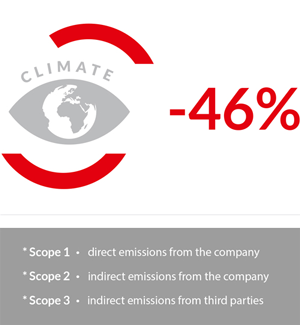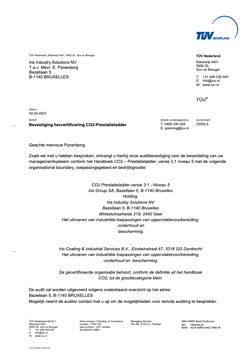
Our role in society
Our activities have an impact on the environment and the society in which we operate
We recognize the challenges and risks inherent in our business activities, and take responsibility for managing and minimizing them. However, to build a sustainable future, we need to do more than just reduce our own impact. That is why we also consciously look for ways to fulfill our social role in a broader way.
We offer opportunities to people who are far from the labor market and do everything possible to integrate vulnerable populations, we join the fight against climate change and we join forces with our various partners to share our knowledge and expertise to achieve a more sustainable society.
Evolution of CO2 emissions
Emissions are decreasing but are not yet at the level required to meet our reduction targets of 46% by 2030.
Our CO2 emissions, related to the energy used for our buildings, vehicle fleet, and machinery at construction sites, have slightly decreased compared to last year. However, the current results do not meet our ambitions, partly due to the exceptional level of activity in 2023.
Key Developments:
Overall Improvement Except for Iris Industry Solutions
Most of our entities have seen their emissions decrease, thanks to the electrification of our vehicle fleet (50% of our vehicles are fully electric) and a slight improvement in emissions related to our buildings. However, Iris Industry Solutions, responsible for 74% of the group’s emissions (Scope 1 & 2), has experienced a significant increase due to fuel use at construction sites during an exceptional year.
Initiatives and Technical Constraints
With planned relocations and investments in the coming months, such as the installation of a new HVAC system at the Geel workshop, we hope to further improve our performance. Current technical constraints make certain improvements challenging at this time, but various initiatives to reduce emissions are being studied (e-CO2tainers or hydrogen group at IND) or are in early stages (electrification of our company vehicles).
Expanded Scope 3
The calculation of our Scope 3 emissions is progressing, gradually integrating our purchases, waste, and employees’ commuting. It is evident that, as with many service companies, the majority of our emissions are indirect (Scope 3). We therefore plan to launch initiatives to improve our indirect impact (promoting sustainable commuting for our employees, partnerships with our suppliers, etc.).

Conclusion
While progress has been made, further efforts are necessary to achieve our CO2 emission reduction goals.

Reducing our environmental impact
Our goals for 2030**
Companies have a key role to play in reducing carbon emissions and creating a resilient zero-emission economy.
Iris has already included climate change targets in its strategy. To ensure that targets are consistent with the Paris climate agreement, the Sciences Based Target Initiative (SBTi) model is one of several initiatives that align emissions reduction goals with the latest climate science data’s. Iris decided to use this model to determine its carbon footprint reduction ambitions. The SBTi model is one of the best-known and internationally recognized methods for setting a carbon reduction ambition.
A Science Based Target (SBT) is a target that corresponds to the level of decarbonization deemed necessary to achieve the goals of the Paris Agreement. A target of 1.5°C became the new norm.

Below is the SBT modeling for scope 1* and 2*, in line with the current SBTi requirements. Under the new absolute reduction approach of the SBT, Iris has decided to reduce its absolute scope 1 and 2 emissions by 46% by 2030 to be in line with the SBT.
* reference year 2019
For indirect CO2 emissions in scope 3* resulting from our activities with customers and suppliers, Iris will conduct a chain analysis to further reduce them and set concrete targets for 2030.
CO2 compensation
Iris is committed to decarbonizing its value chain through reduction measures. For the remaining GHG emissions (scope 1 & 2), IRIS made a financial contribution to support global efforts to achieve the temperature goals of the Paris Agreement.
This has been done through an allocated budget of 30,000 EUR in the year 2023 to contribute to a regional tree planting project in Belgium with Life Terra combined with a forest protection project in Brazil. And a contribution toward a Hydropower Wind Energy Project in Indonesia. The allocated amount enables the avoidance, reduction, and removal of emissions through afforestation, forest protection, and the use of renewable energy.
The projects have been certified by either the CDM or VCS standard. Through this contribution, IRIS supports various sustainable development goals such as no poverty, good health and well-being, clean drinking water, life on land, and climate action.
- Certified project: ‘Tree planting project Life Terra‘
As part of the launch of the ‘Iris Landscaping Solutions’ campaign in May 2021, Iris is supporting the Chiquitania Project in Bolivia.
Subscribe to our newsletter
"*" indicates required fields
